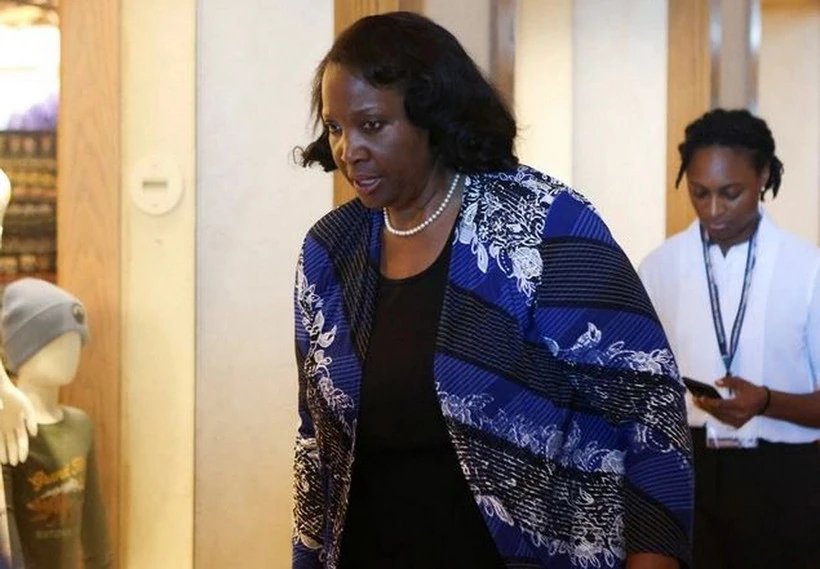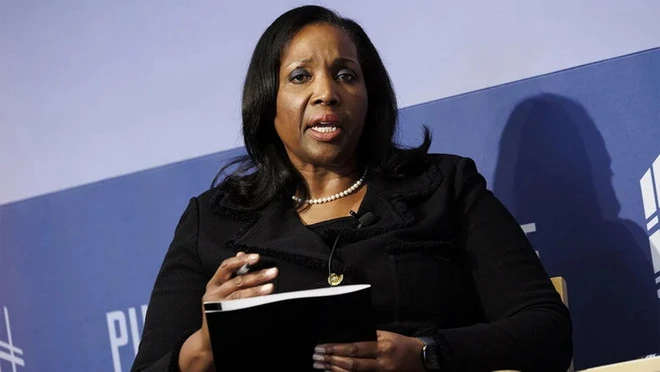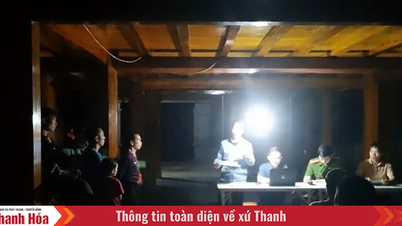Fed Governor Lisa Cook. (Photo: Reuters)
The decision raises profound questions about presidential power over an independent monetary policymaking body, especially given the allegations surrounding Ms. Cook’s personal mortgage dealings.
President Trump announced the firing of Ms. Cook, effective immediately, citing his authority under the Federal Reserve Act and Article II of the U.S. Constitution.
In a letter to Ms. Cook, the US President accused Ms. Cook of "fraudulent and possibly criminal financial behavior."
Specifically, in 2021, Ms. Cook declared on separate mortgage documents for two properties in Michigan and Georgia that both were her primary residences, where she intended to live. Notably, loans for primary residences typically have lower interest rates than those for investment properties.
Mr. Trump asserted that this behavior “at the very least shows serious negligence in financial transactions,” calling into question her competence and credibility as a financial regulator.
Questions about Ms Cook's mortgage were first raised last week by Federal Housing Finance Agency Director William Pulte, who referred the case to Attorney General Pamela Bondi for investigation.
Ms. Cook, the first woman of color to be appointed to the Fed governorship, was appointed by former President Joe Biden to the position in 2022 for a term that runs through 2038.
Reaction from Lisa Cook and experts
Immediately after President Trump’s announcement, Governor Lisa Cook reacted strongly, asserting that Mr. Trump “has no legal basis, and he has no right” to fire her. The female governor declared that she will not resign and will continue to carry out her duties to support the US economy .
Cook's attorney, Abbe Lowell, stressed that President Trump's request "lacks due process, basis, or legal authority." Trump's new move is the first attempt to fire a Fed governor, turning the matter into an unprecedented legal challenge.
Ms. Lisa Cook. (Source: Bloomberg)
Professor Peter Conti-Brown of the University of Pennsylvania, a scholar of Fed history, argues that Cook’s mortgage transactions took place before she was appointed to the Fed and was vetted and confirmed by the Senate, so holding up the actions of a private citizen as grounds for removal from an official position is inconsistent with the entire concept of removal.
Senator Elizabeth Warren also had mixed opinions about Mr. Trump's move, saying that it "must be overturned in the courts." The case is likely to lead to a bitter legal battle and could eventually be decided by the US Supreme Court.
Columbia Law School professor Kathryn Judge emphasized that the Fed Act does not specify what “for cause” means, so this issue will become the center of legal litigation.
In addition, expert Tim Duy of SGH Macro Advisors commented: "This move shows the determination of President Trump's administration in reshaping the Fed, and is also a warning to other officials appointed by Mr. Biden. If in the first term, the Fed could avoid pressure from Mr. Trump, this time the situation will be different."
Influence
According to some observers, President Trump's move poses a serious threat to the Fed's principle of independence.
Academic studies have shown that monetary policymakers who are independent of political influence tend to do better in managing inflation, so the move puts the independence of the world’s most influential central bank to the test. If successful, firing Cook would allow Trump to name a fourth person to the Fed’s seven-member board, significantly strengthening his influence at the central bank.
This is seen as a sign of the Trump administration's determination to "reshape the Fed" and a warning to other candidates appointed by former US President Joe Biden. Mr. Trump has long expressed disagreement with Fed Chairman Jerome Powell for not cutting interest rates sooner.
Financial markets reacted strongly to Mr Trump’s move, with the yield on the 2-year US Treasury note, which is sensitive to short-term Fed policy expectations, falling sharply, while the yield on the longer-term 10-year note rose sharply, reflecting inflation risks. The market reaction suggests that the Fed’s policy rate could fall, but it may come at the cost of weakening the central bank’s commitment to fighting inflation.
The case involving Lisa Cook is not just a personal legal dispute, but also a historic confrontation that directly challenges the foundation of the Fed’s independence. The outcome of the legal battle could potentially set an important precedent for limiting presidential power over independent agencies and shape the future of U.S. monetary policy.
The question is whether the Fed can maintain its credibility and independence amid growing political pressure, and what the long-term impact will be on investor confidence in US monetary policy and global economic stability./.
According to VNA
Source: https://baothanhhoa.vn/tuong-lai-cua-fed-se-ra-sao-sau-khi-tong-thong-trump-sa-thai-ba-lisa-cook-259599.htm





![[Photo] The first meeting of the Cooperation Committee between the National Assembly of Vietnam and the National People's Congress of China](https://vphoto.vietnam.vn/thumb/1200x675/vietnam/resource/IMAGE/2025/8/31/f5ed4def2e8f48e1a69b31464d355e12)
![[Photo] General Secretary To Lam receives Chairman of the National People's Congress of China Zhao Leji](https://vphoto.vietnam.vn/thumb/1200x675/vietnam/resource/IMAGE/2025/8/31/5af9b8d4ba2143348afe1c7ce6b7fa04)

![[Photo] National Assembly Chairman Tran Thanh Man welcomes and holds talks with Chairman of the National People's Congress of China Zhao Leji](https://vphoto.vietnam.vn/thumb/1200x675/vietnam/resource/IMAGE/2025/8/31/9fa5b4d3f67d450682c03d35cabba711)

![[Photo] Marching together in the hearts of the people](https://vphoto.vietnam.vn/thumb/1200x675/vietnam/resource/IMAGE/2025/8/31/8b778f9202e54a60919734e6f1d938c3)






















































































Comment (0)